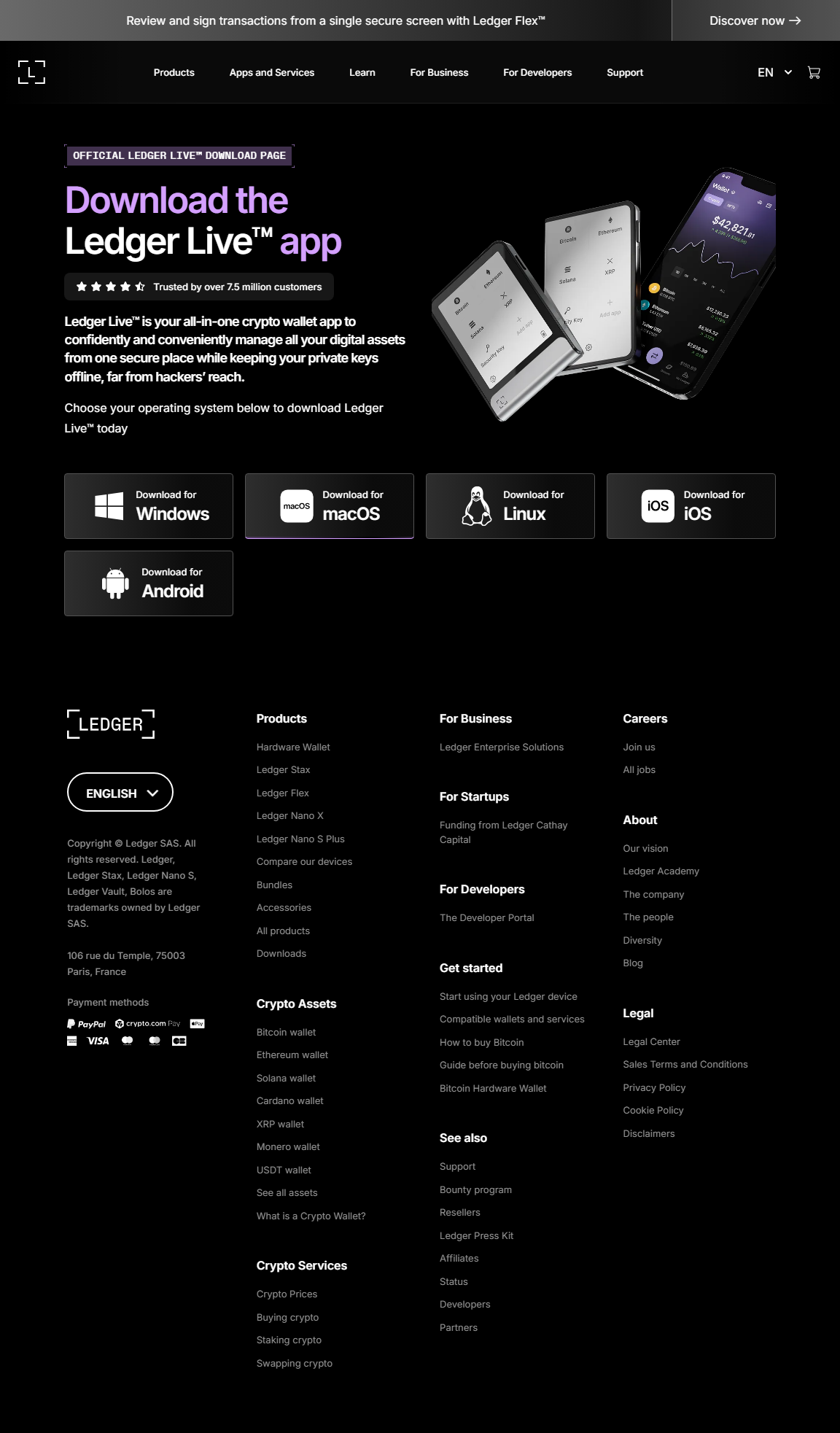Ledger.com/start — Official Setup & Security Guide
How to initialize your Ledger device, install Ledger Live correctly from Ledger.com/start, protect your recovery seed, and adopt best practices for hardware-wallet ownership in 2025.
Why start at Ledger.com/start?
The first click you make when setting up a hardware wallet can determine whether your funds stay safe or get exposed. Ledger.com/start is the manufacturer’s verified onboarding portal — it delivers authentic Ledger Live downloads, signed firmware, and step-by-step instructions. Using it removes risky detours: fake apps, modified installers, or misleading blog links that lead to phishing and key theft.
Clean install
Official Ledger Live installers and app store links delivered safely.
Firmware integrity
Cryptographically signed firmware updates — only from Ledger’s servers.
Quick overview: what you’ll learn
- How to reach the official download path and verify authenticity.
- Step-by-step device initialization, PIN & 24-word recovery setup.
- Best practices: seed security, backups (metal plates), and passphrase usage.
- Connecting to Ledger Live, installing apps, staking, and DeFi integrations.
- Triage for common problems: detection, firmware, Bluetooth, and more.
Deep dive — Step-by-step: Using Ledger.com/start the safe way
1 — Verify the URL
Type ledger.com/start manually. Check for HTTPS and the padlock. Do not click links from social posts or emails.
2 — Download Ledger Live
Pick the correct platform (Windows, macOS, Linux, Android, iOS). Use official app stores or the site installer to avoid tampered installers.
3 — Install & launch
Install Ledger Live, open the app, and follow the built-in onboarding wizard to connect your device.
4 — Initialize your Ledger device
- Choose "Set up as new device" (unless you are restoring).
- Create a PIN directly on the device screen — never on your computer.
- Write down the 24-word recovery phrase exactly as shown, in order.
Note: Ledger will never ask you for the recovery phrase online. Treat it like a bank vault key — offline, physical, private.
5 — Install apps & add accounts
Within Ledger Live, open the Manager tab, install specific blockchain apps (Bitcoin, Ethereum, Solana, etc.) on the device, then add the corresponding accounts back in the Accounts tab.
Each transaction must be confirmed physically on your device — that’s the whole point of a hardware wallet.
Security checklist — Protecting your recovery seed & private keys
Seed handling (must-do)
- Write the 24-word phrase on paper (or better, a metal backup) immediately.
- Store the physical copy in at least two geographically separate secure locations.
- Never photograph, type, or store the seed digitally (no cloud, no phone photos).
Advanced protections
- Use a metal seed backup (resists fire, water, corrosion).
- Consider a passphrase (creates a hidden, separate wallet) — but understand complexity and the need to manage it securely.
- Test restores on a spare device before trusting a single backup method.
Comparison table — Official portal vs risky alternatives
| What | Ledger.com/start (official) | Third-party downloads / Ads | Marketplace / second-hand devices |
|---|---|---|---|
| Installer authenticity | Verified, signed | Unknown — often modified | High risk — device may be tampered |
| Risk of phishing | Minimal when verifying URL | High | High |
| Firmware integrity | Signed Ledger updates | May include malicious firmware | Tamper risk |
| Recommended for beginners | Yes | No | No — avoid |
Common problems & solutions (triage)
Try a different USB cable or port. For Nano X, re-enable Bluetooth. Restart Ledger Live and the host device.
Ensure stable internet, reinstall Ledger Live if necessary, and avoid system sleep during firmware flashing.
Unpair from system settings, then pair again through Ledger Live. Keep device close and fully charged.
Integrations, staking & DeFi — safe ways to expand usage
Ledger Live supports built-in staking for several proof-of-stake chains and connects to decentralized applications through bridges (e.g., WalletConnect or Ledger Live Web). Always:
- Confirm the exact transaction data on your device display before approving.
- Use smaller test transactions when interacting with unknown smart contracts.
- Prefer Ledger-approved partners listed in the app or on ledger.com to reduce integration risk.
FAQ — quick answers
Yes — it’s the official entry point for installers and guides. Always verify the domain and HTTPS certificate.
Yes. Ledger Live is free and you can use it on several devices; the hardware wallet and recovery seed remain the single source of truth.
Use your 24-word recovery phrase to restore your wallet on a new Ledger or compatible hardware. That phrase is your backup.
Passphrases add security but increase complexity. Only use them if you understand the recovery implications — losing the passphrase means losing access to the derived wallet.
“Start with the authorized path. Your device and recovery phrase are the only things you truly own in crypto — treat them like a bank vault and build your security from there.” — A security practitioner
Final thoughts — Ledger.com/start is more than a link
Using Ledger.com/start is the practical first step toward safe self-custody. It’s not a marketing page — it’s the single secure doorway to authentic Ledger software and instructions. From a careful URL check to recording your 24-word recovery phrase and confirming transactions on-device, each small action compounds into ironclad protection for your Bitcoin, Ethereum, and other crypto holdings.
If you leave today with one takeaway: always initialize and update your hardware wallet from the official portal, keep your recovery seed offline and redundant, and never approve a transaction without reading it on the device screen. That practice will keep your assets safe as the ecosystem evolves.
